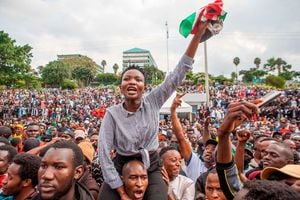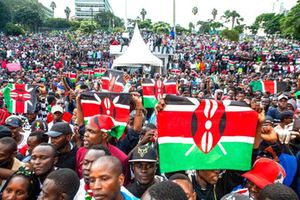
Youths during the Shujaaz Memorial concert held on July 7, 2024 at Uhuru Park in Nairobi.
Power is an aphrodisiac. It’s a seductive, strange, and villainous phenomenon that is about control. I’ve never met anyone who wants less power. Everyone I’ve ever met craves more power, not less. Perhaps the form of power may differ. Some seek hard power. Others desire soft war. But the ends of both forms of power are the same – influence and control. Influence and power to shape destinies of self and others.
In Kenya, the country is at an inflection point again. Every decade or so, Kenya is usually gripped by an epileptic fit about the distribution of power between the state and the people. These historic and pivotal moments usually appear to promise more, but ultimately deliver less.
Every generation believes that it can tame the insatiable power of the state. New generations are usually idealistic and wide-eyed. They believe in their invincibility and indestructibility. I remember my own “Gen Z” moment in 1981 at the University of Nairobi. Those were heady days. I was a student leader. Then the Kanu party-state reigned supreme.
It controlled everything, even the living trees, except it seemed a smattering of MPs, the doyen of opposition politics Jaramogi Oginga Odinga, and a few incorrigible dissenters. The press buried its head in the sand, afraid of the cudgel of the state. So it fell to us – Gen Zs of the era – to battle the state because it had gagged everyone else.
Important organisations including Cotu and Maendeleo Ya Wanawake had long been pocketed by the state. We used to call them departments of Kanu. It’s true there were civil society organisations, but activist ones were virtually non-existent. There wasn’t a single prototypical human rights organisation in the country. In fact, the term human rights was alien to the native Kenyan tongue. I still remember how every news bulletin started with the name of President Daniel arap Moi being reported as having done this, and that. The man from Baringo was the state, and the state was him. “The people” defrocked him in 1991 when they forced multipartyism on him. They cut him down to a smaller version of himself.
Political illegitimacy
Mzee Jomo Kenyatta, the founding president, was the only one who managed to escape the claws of “the people.” The Burning Spear ruled at a time of great fear of the state. Not even the brazen assassinations of leading critics Pio Gama Pinto, JM Kariuki, and Mzee Kenyatta’s certain successor Tom Mboya gave rise to a tumultuous revolt. But Mr Moi couldn’t even engineer his own succession as Mr Uhuru Kenyatta was pummeled in 2002 by Narc’s Mwai Kibaki. Mr Kibaki himself only managed to retain power by stealing the 2007 elections from ODM’s Raila Odinga. In 2005, President Kibaki was humiliated when he lost the referendum on a new constitution. His successor, Mr Kenyatta, endured years of political illegitimacy.
In these cyclical moments, the people believe they hold the levers of power over the state and the ruling elites. They thought they did so at pivotal moments against Mr Moi, Mr Kibaki, and Mr Kenyatta. However, history shows that those cyclical moments may not be as transformative as people want to believe. It’s true Kenya has made major constitutional strides because of the awakening of the people against the state and ruling elites.
Though imperfect, no one can argue that the defeat of the one-party state in 1991 wasn’t an epochal achievement. Nor can one gainsay the normative transformation of Kenya’s psyche because of the 2010 Constitution. These advances by people power are plain and undeniable.
Change agents
Power is resilient and conservative. Today’s reformers and revolutionaries become the conservatives and oppressors of tomorrow. Reformers and change agents only remain so during a small window of transition, usually three to six months. They normally revert to a staid and conservative status quickly once they capture state power.
They say you struggle or campaign in poetry but govern in prose. That pithy wisdom means that the state and all ruling elites are inert once in power. That’s because power is akin to a jealous husband. Power is seductive during courtship, but crude after marriage. The moment of inflection is usually brief and very transitional. Which begs the question – what should Kenyans do during this inflectionary and transitional moment?
The Gen Zs, building on past struggles, are playing their historical role as young people. I was afraid in the past couple of years that they would twerk their way into historical oblivion and fail to find their historic purpose. But they have, and in dramatic style. They have shaken the state to its core foundations.
The state must now listen, or risk political cataclysm. President William Ruto must listen keenly and carefully to the heartbeat of the nation. The fundamentals of his government must dramatically change. He must deeply reconstitute his regime in norm and practice. He shouldn’t rest easy, or revert to the status quo. Power must cede to the people.
Makau Mutua is SUNY Distinguished Professor and Margaret W. Wong Professor at Buffalo Law School, The State University of New York. X: @makaumutua.










